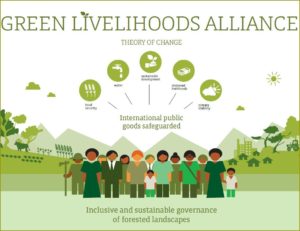Green Livelihoods Alliance Programme Launched in Ghana
 Low remuneration, inadequate staff strength, lack of resources and logistical support are among the numerous problems plaguing Ghana’s Forestry Commission (FC) and undermining its efforts at patrolling the country’s forest reserves to protect it from the activities of chainsaw operators and illegal miners which have degraded its forests. The resulting adhoc exploitation of the country’s forest resources has decimated its forest landscapes thus calling for the adoption of new measures to ensure their rehabilitation and sustainable exploitation. It is in this regard that the Green Livelihoods Alliance (GLA) Programme launched on March 15 at Koforidua by Mr Atta Owusu, Eastern Regional Forestry Officer, may provide the key to resolving issues pertaining to the sustainable management and exploitation of Ghana’ s forest landscapes.
Low remuneration, inadequate staff strength, lack of resources and logistical support are among the numerous problems plaguing Ghana’s Forestry Commission (FC) and undermining its efforts at patrolling the country’s forest reserves to protect it from the activities of chainsaw operators and illegal miners which have degraded its forests. The resulting adhoc exploitation of the country’s forest resources has decimated its forest landscapes thus calling for the adoption of new measures to ensure their rehabilitation and sustainable exploitation. It is in this regard that the Green Livelihoods Alliance (GLA) Programme launched on March 15 at Koforidua by Mr Atta Owusu, Eastern Regional Forestry Officer, may provide the key to resolving issues pertaining to the sustainable management and exploitation of Ghana’ s forest landscapes.
Over 100 participants drawn from Civil Society Organisations (CSOs) working in the forestry sector, the Forest Services Division (FSD) of the FC, the Environmental Protection Agency (EPA), District Assemblies, the Juaboso Landscape Management Committee, Milieudefensie, and the media attended the launching ceremony for the programme which is being jointly implemented by Tropenbos Ghana, A Rocha Ghana and Friends of the Earth, Ghana.
The GLA Programme would shift focus in the management of forest landscapes from the current regime to empowering CSOs to promote an inclusive and sustainable governance of forest landscapes by influencing policy at the governmental and corporate levels to support the restoration of degraded landscapes, reduce deforestation and also enhance the socio-economic well being of local communities. This is a far cry from the current management regime under which local communities fall victim to the unscrupulous activities of exploiters of natural resources which impacts negatively on their environment leading to the loss of farmlands and pollution of their water resources which in turn undermine their health.
The GLA Programme is the brain child of Tropenbos International (TBI), International Union for the Conservation of Nature, Netherlands (IUCN-NL), and the Milieudefensie, who in November 2015 entered into a strategic partnership agreement with the Dutch Ministry of Foreign Affairs with the aim of strengthening the role of CSOs in forest governance. As a global programme being implemented in low to low-middle income countries, it will focus on CSOs in Ghana, Nigeria, Uganda, the Democratic Republic of Congo, Indonesia, Liberia, Vietnam, The Philippines, Paraguay and other countries in this economic belt.
Under the programme, the capacity of CSOs in these countries would be strengthened to generate evidence based information to support lobbying and advocacy to influence policy and practice at the local, national and international levels so as to promote inclusive growth and development which would in turn address prevailing inequities in natural resource governance. Touching on the issue of inadequate staff at the FC, Mr Owusu said while the commission is supposed to employ 100 forest guards to monitor Ghana’s forest reserves with each forest guard being responsible for cleaning, inspecting and patrolling a forest boundary line of 10 kilometres twice a year, only 70 forest guards have been employed at the moment. The forest guards also have the additional responsibility of monitoring portions of off-reserve areas for illicit activities in the forest such as the cultivation of hard drugs.
The gap of 30 forest guards means that a large percentage of forest reserves and off-reserve areas remain unmonitored making it easy for galamsey operators and illegal miners to trespass on them. In addition, the forest guards at post are poorly remunerated, and also lack the necessary resources to enable them carry out their duties effectively. The combination of low remuneration and motivation makes them easy prey to illegal miners and chainsaw operators who are able to buy their way into the forest by offering them bribes far in excess of their monthly or even yearly remuneration.
Furthermore, the FC lacks the necessary resources such as vehicles, motorbikes and even bicycles to patrol and when necessary chase and arrest intruders in the forest. And even when they succeed in arresting intruders, they still face the problem of hiring lawyers to represent them in court which in most cases is delayed as a result of lack of funds. While the FC is also charged with establishing tree plantations, their maintenance is hampered by the unavailability of funds so most of these plantations do not benefit from silvicultural practices, are choked with weeds and easily fall prey to bushfires. Mr Owusu welcomed the established of the GLA Programme in Ghana as an opportunity for CSOs and the FC to work collaboratively towards ensuring the restoration and sustainable use of Ghana’s forest resources.
